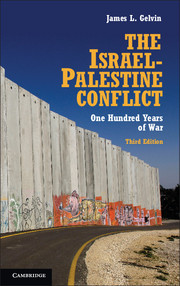Book contents
- Frontmatter
- Contents
- List of Illustrations and Maps
- Author's Note
- 1 The Land and Its Lure
- 2 Cultures of Nationalism
- 3 Zionism and the Colonization of Palestine
- 4 World War I and the Palestine Mandate
- 5 From Nationalism in Palestine to Palestinian Nationalism
- 6 From the Great Revolt through the 1948 War
- 7 Zionism and Palestinian Nationalism: A Closer Look
- 8 The Arab-Israeli Conflict
- 9 The Palestinian National Movement Comes of Age
- 10 Coming Full Circle: Oslo and Its Aftermath
- Glossary
- Time Line of Events
- Biographical Sketches
- Index
- References
6 - From the Great Revolt through the 1948 War
- Frontmatter
- Contents
- List of Illustrations and Maps
- Author's Note
- 1 The Land and Its Lure
- 2 Cultures of Nationalism
- 3 Zionism and the Colonization of Palestine
- 4 World War I and the Palestine Mandate
- 5 From Nationalism in Palestine to Palestinian Nationalism
- 6 From the Great Revolt through the 1948 War
- 7 Zionism and Palestinian Nationalism: A Closer Look
- 8 The Arab-Israeli Conflict
- 9 The Palestinian National Movement Comes of Age
- 10 Coming Full Circle: Oslo and Its Aftermath
- Glossary
- Time Line of Events
- Biographical Sketches
- Index
- References
Summary
The Palestinians and the Zionists were not the only ones to draw lessons from the Great Revolt. The British did as well. The Great Revolt was the first in a series of events that eventually led to the British withdrawal from Palestine. While the British had taken the mandate for Palestine for a number of reasons, high on the list was their belief that control over the area would enhance imperial defense. Ongoing turmoil in Palestine disabused them of this view. Thus, the British ultimately reached the conclusion that, when it came to Palestine, the game was not worth the candle.
In addition to the military response described in the previous chapter, the British attempted to find a political solution to their Palestine problem. Two such attempts are particularly significant. In 1937, during a lull in the fighting, the British government appointed a Royal Commission under the direction of Earl Peel, the secretary of state for India. The report of the commission was a shock to everyone involved, including the British government. According to the Royal Commission, the mandate had been premised on the idea that the Palestinian population would acquiesce to the Balfour Declaration once it came to realize the material benefits of Zionist immigration. Instead of welcoming the “civilizing mission” of the Zionists, however, the indigenous population of Palestine resisted Zionist settlement, and the rift between the two communities grew:
The estranging force of conditions inside Palestine is growing year by year. The educational systems, Arab and Jewish, are schools of nationalism, and they have only existed for a short time. Their full effect on the rising generation has yet to be felt. And patriotic “youth-movements,” so familiar a feature of present-day politics in other countries of Europe or Asia, are afoot in Palestine. As each community grows, moreover, the rivalry between them deepens. The more numerous and prosperous and better-educated the Arabs become, the more insistent will be their demand for national independence and the more bitter their hatred of the obstacle that bars the way to it. As the Jewish National Home grows older and more firmly rooted, so will grow its self-confidence and political ambition.
- Type
- Chapter
- Information
- The Israel-Palestine ConflictOne Hundred Years of War, pp. 117 - 144Publisher: Cambridge University PressPrint publication year: 2014



